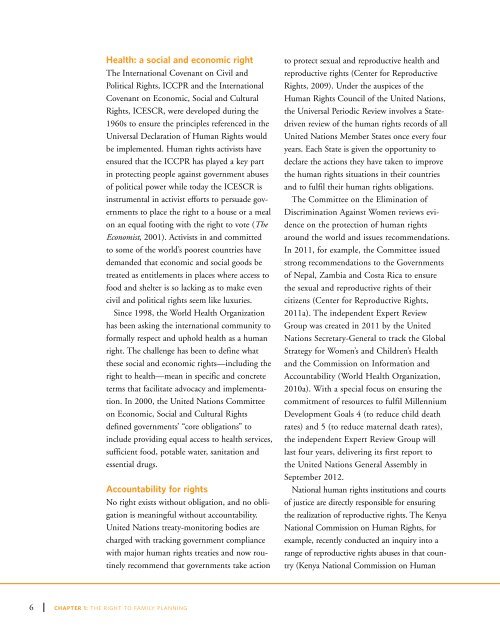State of World Population 2012 - Country Page List - UNFPA
State of World Population 2012 - Country Page List - UNFPA
State of World Population 2012 - Country Page List - UNFPA
You also want an ePaper? Increase the reach of your titles
YUMPU automatically turns print PDFs into web optimized ePapers that Google loves.
Health: a social and economic right<br />
The International Covenant on Civil and<br />
Political Rights, ICCPR and the International<br />
Covenant on Economic, Social and Cultural<br />
Rights, ICESCR, were developed during the<br />
1960s to ensure the principles referenced in the<br />
Universal Declaration <strong>of</strong> Human Rights would<br />
be implemented. Human rights activists have<br />
ensured that the ICCPR has played a key part<br />
in protecting people against government abuses<br />
<strong>of</strong> political power while today the ICESCR is<br />
instrumental in activist efforts to persuade governments<br />
to place the right to a house or a meal<br />
on an equal footing with the right to vote (The<br />
Economist, 2001). Activists in and committed<br />
to some <strong>of</strong> the world’s poorest countries have<br />
demanded that economic and social goods be<br />
treated as entitlements in places where access to<br />
food and shelter is so lacking as to make even<br />
civil and political rights seem like luxuries.<br />
Since 1998, the <strong>World</strong> Health Organization<br />
has been asking the international community to<br />
formally respect and uphold health as a human<br />
right. The challenge has been to define what<br />
these social and economic rights—including the<br />
right to health—mean in specific and concrete<br />
terms that facilitate advocacy and implementation.<br />
In 2000, the United Nations Committee<br />
on Economic, Social and Cultural Rights<br />
defined governments’ “core obligations” to<br />
include providing equal access to health services,<br />
sufficient food, potable water, sanitation and<br />
essential drugs.<br />
Accountability for rights<br />
No right exists without obligation, and no obligation<br />
is meaningful without accountability.<br />
United Nations treaty-monitoring bodies are<br />
charged with tracking government compliance<br />
with major human rights treaties and now routinely<br />
recommend that governments take action<br />
to protect sexual and reproductive health and<br />
reproductive rights (Center for Reproductive<br />
Rights, 2009). Under the auspices <strong>of</strong> the<br />
Human Rights Council <strong>of</strong> the United Nations,<br />
the Universal Periodic Review involves a <strong>State</strong>driven<br />
review <strong>of</strong> the human rights records <strong>of</strong> all<br />
United Nations Member <strong>State</strong>s once every four<br />
years. Each <strong>State</strong> is given the opportunity to<br />
declare the actions they have taken to improve<br />
the human rights situations in their countries<br />
and to fulfil their human rights obligations.<br />
The Committee on the Elimination <strong>of</strong><br />
Discrimination Against Women reviews evidence<br />
on the protection <strong>of</strong> human rights<br />
around the world and issues recommendations.<br />
In 2011, for example, the Committee issued<br />
strong recommendations to the Governments<br />
<strong>of</strong> Nepal, Zambia and Costa Rica to ensure<br />
the sexual and reproductive rights <strong>of</strong> their<br />
citizens (Center for Reproductive Rights,<br />
2011a). The independent Expert Review<br />
Group was created in 2011 by the United<br />
Nations Secretary-General to track the Global<br />
Strategy for Women’s and Children’s Health<br />
and the Commission on Information and<br />
Accountability (<strong>World</strong> Health Organization,<br />
2010a). With a special focus on ensuring the<br />
commitment <strong>of</strong> resources to fulfil Millennium<br />
Development Goals 4 (to reduce child death<br />
rates) and 5 (to reduce maternal death rates),<br />
the independent Expert Review Group will<br />
last four years, delivering its first report to<br />
the United Nations General Assembly in<br />
September <strong>2012</strong>.<br />
National human rights institutions and courts<br />
<strong>of</strong> justice are directly responsible for ensuring<br />
the realization <strong>of</strong> reproductive rights. The Kenya<br />
National Commission on Human Rights, for<br />
example, recently conducted an inquiry into a<br />
range <strong>of</strong> reproductive rights abuses in that country<br />
(Kenya National Commission on Human<br />
6 CHAPTER 1: THE RIGHT TO FAMILY PLANNING
















